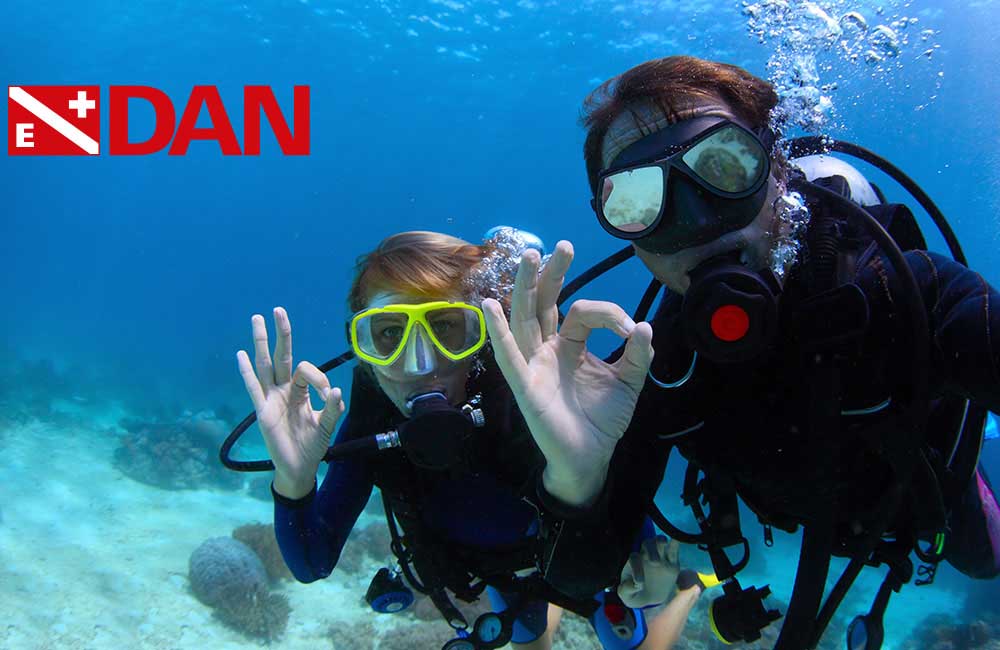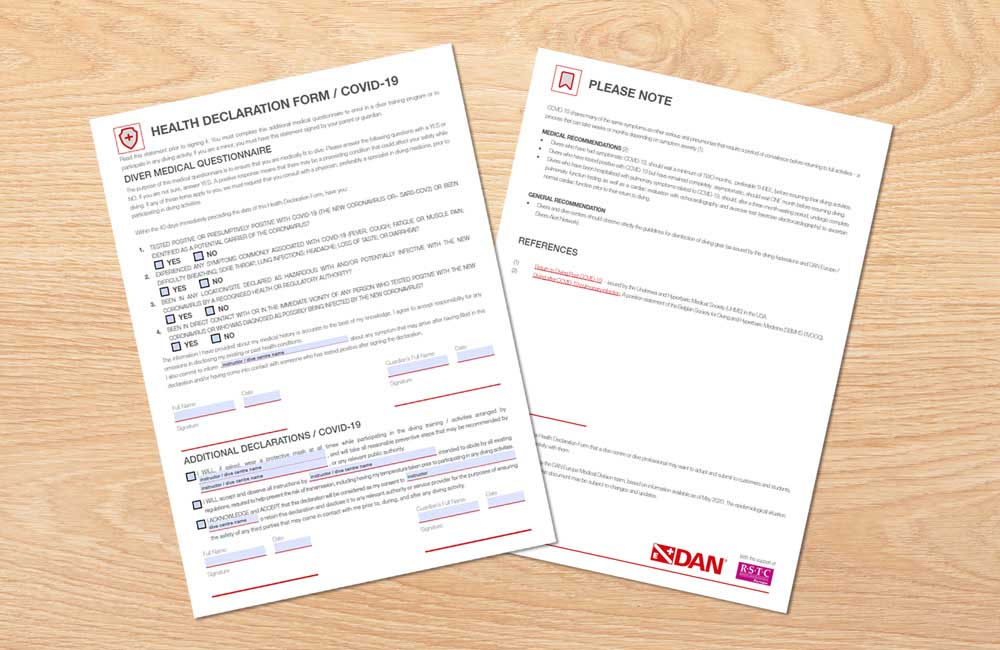
The Diver’s Alert Network (DAN) has issued updated advice relating to divers who have suffered from Covid-19 infections and are planning a return to scuba diving. Covid-19 has particular implications for the scuba diving community as the SARS-COV-2 virus which causes it targets the heart, lungs, circulatory and respiratory systems – those most affected by pressure when we dive.
In May 2020, the Diver’s Alert Network (DAN) published recommendations for scuba divers planning to return to the water after a Covid-19 infection. The recommendations were based on medical advice compiled by the Undersea and Hyperbaric Medical Society (UHMS) in the USA, the Belgian Society for Diving and Hyperbaric Medicine (SBMHS-BVOOG), the European Committee for Hyperbaric Medicine and Underwater and Baromedical Society (ECHM & EUBS), and the University of California at San Diego (UCSD).
Little was known at that time about the effects of Covid-19, however, almost one year later there is much more data available on the damage that SARS-COV-2 can do to the heart and lungs, and also what has become known as ‘long covid’, which may go unnoticed by those who are affected, but which can remain for several months following an apparent recovery from infection.
With scuba diving being allowed to resume in many locations, DAN has updated its guidelines for divers who are concerned about returning to the water. Although there is little practical information on the long-term impact of Covid-19 and scuba diving, the experience of DAN Europe physicians who have treated scuba divers who have suffered from Covid-19 has also been included in the update.
DAN notes that the recommendations may vary slightly between countries, but all divers returning to the water following a Covid-19 infection, whether they experienced symptoms or not, are urged to exercise caution before doing so. DAN also issued a medical declaration form to cover Covid-related illness.
Medical Recommendations for Returning to Diving
Note: all fit-to-dive medical clearance tests should be performed by a specialist in diving (hyperbaric) medicine. Any cardiac (heart) or pulmonary (lung-function) tests performed due to Covid-19 should be interpreted and validated by a diving medical specialist as part of that process.
- Divers who have tested positive for Covid-19 but remained completely asymptomatic: wait at least 30 days from the first negative test before applying for fit-to-dive clearance and eventually going back to diving.
- Had symptomatic Covid-19: wait at least 30 days from the first negative test, plus an additional 30 days without symptoms (a total of two months) before applying for fit-to-dive clearance conducted by a diving medicine specialist.
- Hospitalised with Covid-19 or related pulmonary (breathing) problems: wait at least THREE months before applying for fit-to-dive clearance conducted or coordinated by a diving medicine specialist. The clearance should include complete pulmonary function testing, an exercise test with oxygen saturation measurement and a high-resolution CT scan of the lungs to verify a return to normal.
- Hospitalised with Covid-19 or related cardiac (heart) problems: wait at least THREE months before applying for fit-to-dive clearance conducted or coordinated by a diving medicine specialist. The clearance should include cardiac evaluation, including echocardiography and an exercise test (exercise electrocardiography) to ascertain normal cardiac function.

Other Risk Factors
Due to the complications caused by Covid-19, there are other risk factors associated with scuba diving for which there is very little – if any – data at all. It is known that the SARS-COV-2 can cause serious, long-term damage to the heart and lungs which potentially may increase the risk of pulmonary barotrauma (lung overexpansion injuries), pulmonary oxygen toxicity, and other forms of decompression illness, including decompression sickness (DCS or ‘the bends’)
The most important step in determining if a diver is at a higher risk of being affected by one or more of these problems is through a diving medical examination, and DAN urges divers who may be at risk to consider that:
- Damage to the lungs caused by Covid-19 may lead to Pulmonary Overpressure Syndrome (aka lung barotrauma or a lung overexpansion injury), regardless of whether or not a diver makes a rapid or uncontrolled ascent
- At-risk divers should avoid technical and rebreather diving which involves prolonged exposure to hyperoxic gas mixtures with an oxygen partial pressure of 1.3 ATA or higher. Recreational style ‘simple nitrox diving’ – during which divers might breathe a maximum ppO2 of 1.4 ATA for only a few moments – is not expected to present any problem.
- Divers who have suffered from pulmonary symptoms during a Covid-19 infection should limit their dives to well within the no-decompression limits (NDL) of their dive computers and avoid mandatory decompression stops.
(so that at no moment during the dive, the computer indicates mandatory decompression stops). (Reference: Belgian Society for Diving and Hyperbaric Medicine)
Preventing the Spread of Covid-19
It is generally accepted that Covid-19 will remain with us for some time – possibly permanently – and therefore present an ongoing risk of transmission and infection. The general advice for preventing the spread of SARS-COV-2 at this time remains the same:
- Continue social distancing and wear face masks at the surface
- Thoroughly disinfect all dive equipment
- Don’t use communal rinse tanks
- Avoid air-sharing or regulator exchange except in emergencies
- Plan out-of-air training exercises in such a way that regulators are not shared
The full article published by DAN in Alert Diver can be found at www.alertdiver.eu/en_US/articles/what-you-should-know-about-diving-after-covid-19.



